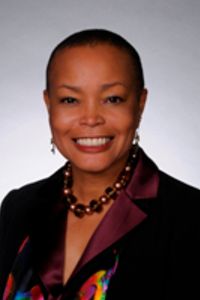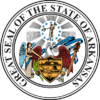Joyce Elliott
Joyce Elliott (Democratic Party) was a member of the Arkansas State Senate, representing District 31. She assumed office in 2009. She left office on January 9, 2023.
Elliott (Democratic Party) ran for election to the U.S. House to represent Arkansas' 2nd Congressional District. She lost in the general election on November 3, 2020.
Elliott completed Ballotpedia's Candidate Connection survey in 2020. Click here to read the survey answers.
Elliott served in the Arkansas House of Representatives from 2000 to 2006.
Biography
Elliott was born on March 20, 1951, in Willisville, Arkansas. She earned her B.A. in English and speech from Southern Arkansas University in 1973 and her M.A. in English from Ouachita Baptist University in 1981. Her professional experience includes working for The College Board, as a High School Teacher in Arkansas, Texas, Florida, and Minnesota, and as the director of legislative outreach for the Southwestern Region for The College Board.[1]
Committee assignments
2021-2022
Elliott was assigned to the following committees:
- Senate Education Committee, Vice-chair
- Senate Efficiency Committee
- Senate Insurance and Commerce Committee
- Girls State Committee
- Joint Budget Committee
- Legislative Council
- Legislative Joint Auditing Committee
- Public Retirement and Social Security Programs Committee
2019-2020
Elliott was assigned to the following committees:
- Joint Budget Committee
- Academic Facilities Oversight Committee
- Legislative Council
- Legislative Joint Auditing Committee
- Public Retirement and Social Security Programs Committee
- Senate Education Committee, Vice-Chair
- Senate Insurance and Commerce Committee
- Arkansas Legislative Black Caucus, Chair
2017 legislative session
At the beginning of the 2017 legislative session, this legislator served on the following committees:
| Arkansas committee assignments, 2017 |
|---|
| • Education, Vice chair |
| • Insurance and Commerce |
| • Joint Budget |
| • Joint Budget |
| • Public Retirement and Social Security Programs |
| • Public Retirement and Social Security Programs |
2015 legislative session
At the beginning of the 2015 legislative session, Elliott served on the following committees:
| Arkansas committee assignments, 2015 |
|---|
| • Judiciary |
| • State Agencies and Governmental Affairs |
| • Efficiency |
| • Public Retirement and Social Security Programs, Vice chair |
| • Legislative Facilities |
| • Joint Budget |
| • Legislative Council |
| • Legislative Joint Auditing |
2013-2014
At the beginning of the 2013 legislative session, Elliott served on the following committees:
| Arkansas committee assignments, 2013 |
|---|
| • Education, Vice Chair |
| • Legislative Council |
| • Joint Budget |
| • Insurance and Commerce |
| • Public Retirement and Social Security Programs |
| • Rules, Resolutions and Memorials |
| • Academic Facilities Oversight |
2011-2012
In the 2011-2012 legislative session, Elliott served on these committees:
| Arkansas committee assignments, 2011 |
|---|
| • Legislative Council |
| • Joint Budget |
| • Education |
| • Insurance and Commerce |
| • Public Retirement and Social Security Programs, Vice Chair |
| • Rules, Resolutions and Memorials |
2009-2010
In the 2009-2010 legislative session, Elliott served on these committees:
| Arkansas committee assignments, 2009 |
|---|
| • City, County and Local Affairs |
| • Education |
| • Public Health, Welfare and Labor |
| • Rules, Resolutions and Memorials |
Sponsored legislation
The following table lists bills this person sponsored as a legislator, according to BillTrack50 and sorted by action history. Bills are sorted by the date of their last action. The following list may not be comprehensive. To see all bills this legislator sponsored, click on the legislator's name in the title of the table.
Elections
2022
- See also: Arkansas State Senate elections, 2022
Joyce Elliott did not file to run for re-election.
2020
See also: Arkansas' 2nd Congressional District election, 2020
Arkansas' 2nd Congressional District election, 2020 (March 3 Democratic primary)
Arkansas' 2nd Congressional District election, 2020 (March 3 Republican primary)
General election
General election for U.S. House Arkansas District 2
Incumbent French Hill defeated Joyce Elliott in the general election for U.S. House Arkansas District 2 on November 3, 2020.
Candidate | % | Votes | ||
| ✔ |  | French Hill (R) | 55.4 | 184,093 |
 | Joyce Elliott (D)  | 44.6 | 148,410 | |
| Total votes: 332,503 | ||||
 = candidate completed the Ballotpedia Candidate Connection survey. = candidate completed the Ballotpedia Candidate Connection survey. | ||||
| If you are a candidate and would like to tell readers and voters more about why they should vote for you, complete the Ballotpedia Candidate Connection Survey. | ||||
Do you want a spreadsheet of this type of data? Contact our sales team. | ||||
Withdrawn or disqualified candidates
- J. Glenn Smith (Independent)
Democratic primary election
The Democratic primary election was canceled. Joyce Elliott advanced from the Democratic primary for U.S. House Arkansas District 2.
Republican primary election
The Republican primary election was canceled. Incumbent French Hill advanced from the Republican primary for U.S. House Arkansas District 2.
2018
- See also: Arkansas State Senate elections, 2018
General election
The general election was canceled. Incumbent Joyce Elliott won election in the general election for Arkansas State Senate District 31.
Democratic primary election
Democratic primary for Arkansas State Senate District 31
Incumbent Joyce Elliott advanced from the Democratic primary for Arkansas State Senate District 31 on May 22, 2018.
Candidate | ||
| ✔ |  | Joyce Elliott |
 = candidate completed the Ballotpedia Candidate Connection survey. = candidate completed the Ballotpedia Candidate Connection survey. | ||||
| If you are a candidate and would like to tell readers and voters more about why they should vote for you, complete the Ballotpedia Candidate Connection Survey. | ||||
Do you want a spreadsheet of this type of data? Contact our sales team. | ||||
2014
- See also: Arkansas State Senate elections, 2014
Elections for the Arkansas State Senate took place in 2014. A primary election took place on May 20, 2014; a runoff election took place on June 10, 2014. The general election was held on November 4, 2014. The signature filing deadline for candidates wishing to run in this election was March 3, 2014. Incumbent Joyce Elliott was unopposed in the Democratic primary and was unchallenged in the general election.[2][3]
2012
- See also: Arkansas State Senate elections, 2012
Elliott ran for re-election in the 2012 election for Arkansas Senate, District 31. Elliott defeated Fred Allen in the May 22 Republican primary and ran unopposed in the general election on November 6, 2012.[4][5][6]
| Party | Candidate | Vote % | Votes | |
|---|---|---|---|---|
| Democratic | 86.2% | 24,407 | ||
| Libertarian | Glen Schwarz | 13.8% | 3,917 | |
| Total Votes | 28,324 | |||
| Candidate | Vote % | Votes |
|---|---|---|
|
|
62.7% | 3,963 |
| Fred Allen | 37.3% | 2,362 |
| Total Votes | 6,325 | |
2008
On November 4, 2008, Elliott won election to the 33rd District Seat in the Arkansas State Senate, running unopposed in the general election.[7]
Elliott raised $171,751 for her campaign.[8]
Campaign themes
2020
Ballotpedia survey responses
See also: Ballotpedia's Candidate Connection
Joyce Elliott completed Ballotpedia's Candidate Connection survey in 2020. The survey questions appear in bold and are followed by Elliott's responses. Candidates are asked three required questions for this survey, but they may answer additional optional questions as well.
| Collapse all
I was born and raised in rural Willisville, Arkansas, population 152. My upbringing in Willisville instilled values of hard work and perseverance and inspired me to lead a life dedicated to public service.
I put these lessons to the test at an early age as one of the first African American students to integrate her local high school. There, I overcame adversity to become the second African American to graduate from the newly integrated high school. My older sister was the first.
After school, I spent 30 years teaching English and speech to provide high school students with opportunities I never had. But I saw forces outside the classroom affecting my students. With that in mind, I ran for office to expand my impact from students in my classroom to people all around the state.
For nearly 20 years, I have served as a state legislator working to expand access to affordable healthcare, improve education outcomes, and support working families. For these efforts, I've been recognized as one of Arkansas's most effective legislators.
- I lead from experience. I know what it's like to struggle to make ends meet and I use this perspective to fight for middle and working class families.
- I have a track record of reaching across party lines to improve our quality of life-from expanding Medicaid to creating what became the #1 state pre-K program in America.
- As a 30-year public school teacher, I will work in Congress to help us have a world-class education system.
1. Expanding access to affordable healthcare
2. Building back our economy with a strong and resilient working class
3. Creating a world-class education system
The Courage of their Convictions by Peter Irons
In my time as a legislator in Arkansas, I've developed the ability to collaborate effectively and work across party lines to pass beneficial legislation. I believe this collaborative spirit will allow me to serve Arkansans well in Congress.
The first significant historical event I remember was the televised debate between John F. Kennedy and Richard Nixon. I asked my 4th grade math teacher to talk about it with me the next day instead of doing long division. She sent me to the principal's office with the note, "Please talk politics with this child."
"September" - Earth, Wind, and Fire
I favor redistricting that is completed by a non-partisan redistricting commission so that voters can pick their politicians instead of politicians picking their voters.
I do believe past experience in government is helpful for members of Congress. I have learned so much about collaboration and working across the aisle in my 20 years in the Arkansas legislature that will undoubtedly be useful in Washington.
I'm excited for the opportunity to serve on the Education Committee and the Foreign Affairs Committee
Note: Ballotpedia reserves the right to edit Candidate Connection survey responses. Any edits made by Ballotpedia will be clearly marked with [brackets] for the public. If the candidate disagrees with an edit, he or she may request the full removal of the survey response from Ballotpedia.org. Ballotpedia does not edit or correct typographical errors unless the candidate's campaign requests it.
Campaign website
Elliott’s campaign website stated the following:
| “ |
Healthcare We can’t go backward or pursue policies that would disrupt the hard fought-progress we’ve already achieved. Let’s explore every smart policy we can to bring more people in: further expanding Medicaid, incentivizing employers to make it easier to cover their employees, lowering the age of Medicare, stopping prescription drug price gouging, and pursuing a public option where insurance isn't connected to employment. We’re in a pandemic. Washington politicians made this all worse by looking out for themselves instead of looking out for the people. They literally threw out the pandemic response playbook, delaying and denying along the way. Public service is the answer to this public health crisis. There’s no reason for everyday Arkansans to pay the human and economic cost of this catastrophe. The People’s House took a good first step and made COVID-19 testing free. We need to go further to provide healthcare to those who've tested positive. Increase access to quality mental health care for a time where it seems everyone's baseline level of stress has gone up. We can’t let COVID-19 bankrupt people. It’s already done too much. My Healthcare Priorities:
Economy After 2008, I worked with the governor to champion a funding package through the State Senate to support worker training programs, attract outside investment to Arkansas, and create thousands of jobs. Thanks to this program, companies like Caterpillar, HP, and Mitsubishi brought good paying jobs to Arkansas. This economic downturn is different from 2008. Everyone is hurting, and no individual could have planned for this. We can’t penalize people for not pulling themselves up by their bootstraps right now. I don’t favor making things easier only for the wealthy and well-connected. In the State Capitol, I focused on measures like cutting the grocery tax, something that helps everyone. That’s what I’ll do in Washington as well. Public servants in Washington should look out for both employers and employees in this crisis. There’s a clear divide between which industries—through no fault of their own—can adapt to COVID-19 and those that can’t. It’s not realistic for every employer to completely retool and every employee to completely retrain in a few months. Paycheck protection and bridge-loans are the humane, sane thing to do. My Economic Priorities:
Infrastructure One of the great disappointments of this administration has been the lack of investment in rebuilding our nation’s infrastructure. The president missed a critical opportunity to begin new infrastructure projects with bipartisan support. The Highway Trust Fund needs adequate funding now—Arkansas has over 760 bridges that have been deemed “structurally deficient,” and our roads need over $500 per driver per year to stay functional. The COVID-19 pandemic has shown us that internet access should be a public utility. It’s an investment critical to public health and national defense. When schools and businesses closed, having dependable internet at home became key to academic and professional success. Let’s leave no stone unturned: create municipal wifi projects and build public broadband into rural areas. Funding infrastructure isn't just about paving potholes or making it easier on your tires. Our roads connect towns big and small. Communities dependent on tourism need good roads to bring in business. Being able to hop in a car and explore—that's a fundamental part of being an Arkansan and an American. I want the government to ensure we have the ability to do that. My Infrastructure Priorities:
Education In the State Capitol, I led the fight to secure $40 million and create Arkansas’s Pre-K program, which became the #1 program nationwide. I helped pass teacher pay increases so we can help attract folks from all backgrounds in our classrooms. Since then, we’ve seen a concerning drop in government funding for teachers and students from Pre-K all the way to higher education. That isn’t right. Ask any economist—they’d tell you investing in education for our children and young adults is a surefire way to grow our economy long-term. It helps our kids, our families, and our communities. In Congress, I will push for policies to equip states with the resources they need to help their students, families, and teachers. The COVID-19 pandemic is putting a spotlight on the inequalities in our school system. How can we expect students to learn equally from online classes when many of our students don't have adequate internet access? How can students who need to work to put themselves through school continue supporting themselves? This crisis underscores the need for us to help students have a fair shot at a high-quality education. My Education Priorities:
Healing Arkansas We need a comprehensive plan that addresses the immediate issues while fixing the broken foundation that magnifies the problems we’re dealing with right now. Arkansas received $1.25 Billion from the federal government in the CARES Act. Resources of this magnitude don’t come around often. Let’s get this right by investing in the long-term health and quality of life for all Arkansans. Joyce Elliott’s longstanding ties to the community, experience in the state legislature, and platform as a policy innovator on the congressional campaign trail put her in a unique position to chart a course for Arkansas in this crucial time. Part I: $100 Million Investment in UAMS
The University of Arkansas for Medical Sciences (UAMS) hospital system serves as the frontline in our state’s fight against the current health crisis. So many critical policies—the Affordable Care Act, Medicaid Expansion, and protections for pre-existing conditions—can’t be implemented properly without supporting UAMS. Long before COVID-19, UAMS has led our state in healthcare advancement. Nearly half of all physicians in the state and physicians in rural areas were educated at UAMS. Additionally, UAMS is at the forefront of innovation, producing advancements in medical technology and patient services. The UAMS medical system reaches every corner of Arkansas with positive and impactful services. Healthcare workers and essential employees at UAMS are working tirelessly to combat COVID-19 and maintain normal healthcare operations, often without the protective equipment they need. Our state must invest $100 million in UAMS to support the system’s tens of thousands of employees as they work to keep our citizens healthy. Investment in the UAMS system will go toward three areas of Arkansas’s healthcare response to COVID-19. Funding will be used to (1) address shortages of essential medical equipment in hospitals, (2) support important research capabilities in areas of testing and immunizations, and (3) continue training the next generation of Arkansas’s health professionals to serve in our cities and rural towns. This $1.25 billion will address pressing health concerns, but it will also help rebuild and reignite Arkansas’s economy. Funding for UAMS results in long-term economic benefits. For every $1 of taxpayer money invested in the UAMS system, $24.50 is pumped back into the local economy. That turns into $2.45 billion—nearly double the total of the entire CARES Act coronavirus relief fund. Support for UAMS can address our crucial medical emergency while strengthening our long-term recovery. Part II: Economic Health
We can't have people go back to work without a plan in place to protect workers. In addition to taking the necessary public health steps to stop the spread of COVID-19, Joyce proposes that we extend worker’s compensation to cover Arkansas public employees who contract COVID-19 on the job. With a two-step strategy to (1) emphasize prevention strategies for workplaces and (2) increase investment in the state's worker’s compensation fund, we can support our public-sector workers and minimize the financial burden on the state fund. Our firefighters, public school teachers, UAMS workers, and all public employees have the right to be safe on the job. As the private sector grapples with concerns of liability in this unprecedented business environment, this plan's approach to the public sector can serve as a blueprint for a possible solution. In Congress, Joyce will fight to protect every Arkansas worker’s health and safety and support economic opportunity for everyone. This starts by using federal resources to back state-run programs such as the worker’s compensation fund in this time of great need.
Requesting an additional $52.3 million to the the program dedicated to Small Businesses in Arkansas No small business could be expected to have planned for COVID-19. In the worst economic downturn since the Great Depression, we need to support the economic backbone of our communities. With diligent oversight, the Arkansas Ready for Business Program should facilitate grants to provide a lifeline to Arkansas businesses. The program focuses on businesses with 25 or fewer employees to specifically address unexpected costs from the health crisis such as personal protective equipment (PPE), sanitization supplies, and contactless payment technologies. This grant program will (1) allow small businesses across the state to reopen their doors, (2) put hard-working Arkansans back to work, and (3) ensure employees and customers can remain safe while business is open. To date, the state has allocated $147.7 Million to the program. This should be increased to $200 Million to meet the present need of Arkansas businesses. The time for inaction and ineffectiveness is over. In Congress, Joyce will be committed to supporting federal programs that ensure states can financially support small businesses through funds like the Ready for Business Grant Program. She will bring the concerns of small businesses in Arkansas straight to Washington.
Internet access has become a requirement of daily life, though we haven’t done enough to ensure every Arkansan has access to this vital public utility. The COVID-19 crisis has put a spotlight on the unequal internet access in Arkansas. We cannot afford to wait any longer to address this problem. Thousands of Arkansans lack access to telemedicine, critical health information, and economic opportunities that have moved online. Investing $100 million in rural broadband expansion will help the state determine the areas of greatest need in Arkansas and channel funding directly to these locations. Joyce's plan would establish a permanent fund to fast-track proposals for Arkansas companies to start building broadband capacity in rural and underserved urban areas. Now is the time to work towards universal broadband. Investment of $100 million represents a first step that is long overdue. One third of Arkansans live in rural areas. In Congress, Joyce will never back down from the challenge to uplift the needs and concerns of small-town America in this time of crisis.
As a lifelong educator and advocate for public schools in Arkansas, Joyce recognizes the critical decision facing our state in determining the safest way for our students to return to school. Before we send our kids back, Joyce is committed to implementing measures to protect students, their families, and their communities. To accomplish this goal, Joyce plans to make funding available to address essential healthcare needs in all schools including adequate testing procedures, PPE, sanitizing stations, and comprehensive cleaning programs. All students must have access to safe and productive educational environments. In Congress, Joyce will push to be put on the House Education and Labor Committee. She will use her 30+ years of experience in the field of education to safeguard the best interests of students across Arkansas by fighting for increased federal funding to help schools support local communities. Part III: Rural Healthcare
We have a duty to support every Arkansan who is impacted by this global health crisis. Our brave healthcare workers share this sense of responsibility as they provide care to all those affected. We must provide special aid to medical facilities willing and able to treat uninsured and underinsured pandemic victims. These crucial facilities must not be allowed to fail for serving communities in need. Joyce’s proposal seeks to expand the successful Arkansas Works Medicaid program through the Arkansas Department of Health. The plan establishes an emergency medical fund that will directly support medical centers struggling in the face of uncompensated care losses from the COVID-19 crisis. The health of our state and viability of our healthcare system depend on significant financial support. If elected, Joyce will fiercely support medical facilities in their efforts to provide high quality care to all patients. To effectively combat this virus, all those affected must be served. Joyce will work in Congress to direct funds to clinics and medical facilities like those in Arkansas that are putting the health of the nation above their bottom line.
Long before the pandemic, Arkansas’s rural hospitals and health clinics struggled to stay open. Over 1.1 million people (roughly one third of the total state population) live in rural areas in Arkansas. Additional funding is required to provide all Arkansans access to quality healthcare in this time of crisis, no matter where they live. Investment must begin with support for the state’s 28 Critical Access Hospitals. Direct payments of $10 million (totaling $280 million) to each facility will support the only providers of emergency medical services in many rural areas. The final $20 million would be distributed in $100,000 increments to the state’s 99 rural health clinics and 109 rural health centers. The services provided by these facilities are critical to providing all Arkansans, no matter where they live, with primary care and professional medical guidance. In each case, this plan’s proposed funding distribution enables each medical institution to address their greatest needs that have arisen from the crisis. Federal aid must benefit Arkansans in every corner of the state. In Congress, Joyce will be an outspoken proponent of investment in crucial rural healthcare services. Joyce’s small-town upbringing and lifetime of public service in Arkansas to support and advocate for the interests of our state at the federal level. Environment & Energy In my decades as a public servant, I’ve never insisted on a one-size-fits-all solution. That’s how I view balancing our environmental protections with our energy needs. There’s no one kind of energy that will work for us all the way. A progressive, practical solution is to use a combination of energy sources: wind and solar, but also nuclear and natural gas. It’s a unique pleasure to take a day off and walk in Cadron Settlement Park or go hike up Flatside Pinnacle. We need clean water and a protected environment to do that. In Congress, I will fight to bring home renewable energy projects and energy innovation funding so we can pass on our love of nature, hunting, and fishing to the next generation. My Environmental Priorities:
Public Service Reform Oversight and accountability are the key. Take the $2 Trillion relief package passed by Congress in the CARES Act. The House insisted on a special watchdog to ensure that lobbyists and special interests weren’t receiving an undue amount of funding. But then President Trump fired this watchdog knowing he himself wouldn’t be held accountable on a bipartisan basis. No oversight, no accountability, and that hurts all of us. I have a two-pronged approach to fix this. First, we need to stop members of Congress from turning a blind eye to lobbyists corrupting the policymaking process. All too often, this is because lobbyists are former members of Congress themselves, and their clients are big campaign donors. There should be a lifetime ban on members of Congress becoming lobbyists after they leave office. Lobbyists should also have to disclose the donors of all their clients—no more dark money. Second, we need a watchdog with teeth looking over the executive branch. I believe any administration, Republican or Democrat, works better with oversight. I support calls to create an Office of the Public Advocate to hold the executive branch accountable for rule making and policy implementation. My Public Service Reform Priorities:
|
” |
| —Joyce Elliott’s campaign website (2020)[10] | ||
Campaign finance summary

Scorecards
A scorecard evaluates a legislator’s voting record. Its purpose is to inform voters about the legislator’s political positions. Because scorecards have varying purposes and methodologies, each report should be considered on its own merits. For example, an advocacy group’s scorecard may assess a legislator’s voting record on one issue while a state newspaper’s scorecard may evaluate the voting record in its entirety.
Ballotpedia is in the process of developing an encyclopedic list of published scorecards. Some states have a limited number of available scorecards or scorecards produced only by select groups. It is Ballotpedia’s goal to incorporate all available scorecards regardless of ideology or number.
Click here for an overview of legislative scorecards in all 50 states. To contribute to the list of Arkansas scorecards, email suggestions to [email protected].
2022
In 2022, the Arkansas State Legislature was in session from February 14 to March 15.
- Legislators are scored on their votes on bills related to small business issues.
2021
| To view all the scorecards we found for this legislator in 2021, click [show]. |
|---|
|
In 2021, the Arkansas State Legislature was in session from January 11 to October 15.
|
2020
| To view all the scorecards we found for this legislator in 2020, click [show]. |
|---|
|
In 2020, the Arkansas State Legislature was in session from April 8 to April 24.
|
2019
| To view all the scorecards we found for this legislator in 2019, click [show]. |
|---|
|
In 2019, the Arkansas State Legislature was in session from January 14 through April 24.
|
2018
| To view all the scorecards we found for this legislator in 2018, click [show]. |
|---|
|
In 2018, the Arkansas State Legislature was in session from February 12 through March 12. The legislature held a special session from March 13 to March 15.
|
2017
| To view all the scorecards we found for this legislator in 2017, click [show]. |
|---|
|
In 2017, the 91st Arkansas State Legislature was in session from January 9 through May 1. The Legislature held a special session from May 1 to May 3.
|
2016
| To view all the scorecards we found for this legislator in 2016, click [show]. |
|---|
|
In 2016, the 90th Arkansas State Legislature was in session from April 13 through May 9. The Legislature held a three-day special session from April 6 to April 8 over healthcare. The Legislature held a second special session from May 19 to May 23 over transportation.
|
2015
| To view all the scorecards we found for this legislator in 2015, click [show]. |
|---|
|
In 2015, the 90th Arkansas State Legislature was in session from January 12 through April 2.
|
2014
| To view all the scorecards we found for this legislator in 2014, click [show]. |
|---|
|
In 2014, the Arkansas General Assembly was in session from February 10 to March 20. Ballotpedia staff did not find any state legislative scorecards published for this state in 2014. If you are aware of one, please contact [email protected] to let us know. |
2013
| To view all the scorecards we found for this legislator in 2013, click [show]. |
|---|
|
In 2013, the 89th Arkansas State Legislature was in session from January 14 through May 17.
|
2012
| To view all the scorecards we found for this legislator in 2012, click [show]. |
|---|
|
In 2012, the Arkansas General Assembly was in session from February 13 to March 13. Ballotpedia staff did not find any state legislative scorecards published for this state in 2012. If you are aware of one, please contact [email protected] to let us know. |
2011
| To view all the scorecards we found for this legislator in 2011, click [show]. |
|---|
|
In 2011, the 88th Arkansas State Legislature was in session from January 10 to April 27.
|
2016 Democratic National Convention
See also
2020 Elections
External links
|
Candidate U.S. House Arkansas District 2 |
Personal |
Footnotes
- ↑ Information submitted to Ballotpedia through the Candidate Connection survey on September 29, 2020
- ↑ Arkansas Secretary of State, "Candidate Information," accessed March 5, 2014
- ↑ Arkansas Secretary of State, "Official primary election results," accessed June 26, 2014
- ↑ Arkansas Secretary of State, "Election Results 2012," accessed November 7, 2012
- ↑ Arkansas Secretary of State, "2012 Election candidates," March 8, 2012
- ↑ Arkansas Secretary of State, "Arkansas State Primary Election, May 22, 2012," accessed July 11, 2012
- ↑ VoteNaturally.org, "2008 general election results, Arkansas," November 4, 2008
- ↑ Follow the Money, "Arkansas Senate spending, 2008," November 4, 2008
- ↑ Note: This text is quoted verbatim from the original source. Any inconsistencies are attributable to the original source.
- ↑ Joyce Elliott’s campaign website, “Policies,” accessed September 2, 2020
- ↑ 11.0 11.1 Ballotpedia, "Arkansas's Freedom Scorecard," accessed July 10, 2017
- ↑ Ballotpedia's list of superdelegates to the 2016 Democratic National Convention is based on our own research and lists provided by the Democratic National Committee to Vox.com in February 2016 and May 2016. If you think we made an error in identifying superdelegates, please send an email to [email protected].
- ↑ Arkansas Online, “Arkansas’ superdelegates plan to back Clinton next year,” November 13, 2015
- ↑ To find out which candidate a superdelegate supported, Ballotpedia sought out public statements from the superdelegate in other media outlets and on social media. If we were unable to find a public statement that clearly articulated which candidate the superdelegate supported at the national convention, we listed that superdelegate as "unknown." If you believe we made an error in identifying which candidate a superdelegate supported, please email us at [email protected].
- ↑ Congressional Research Service, "The Presidential Nominating Process and the National Party Conventions, 2016: Frequently Asked Questions," December 30, 2015
- ↑ CNN, "2016 Election Center," March 1, 2016
- ↑ The New York Times, “Election 2008: Arkansas Primary Results,” accessed February 29, 2016
- ↑ CNN, "Arkansas Exit Polls," March 1, 2016
- ↑ 19.0 19.1 Democratic National Committee, "2016 Democratic National Convention Delegate/Alternate Allocation," updated February 19, 2016
- ↑ The Green Papers, "2016 Democratic Convention," accessed May 7, 2021
- ↑ Democratic National Committee's Office of Party Affairs and Delegate Selection, "Unpledged Delegates -- By State," May 27, 2016
| Political offices | ||
|---|---|---|
| Preceded by - |
Arkansas State Senate District 31 2009-2023 |
Succeeded by Clint Penzo (R) |
| Preceded by - |
Arkansas House of Representatives 2000-2006 |
Succeeded by - |







